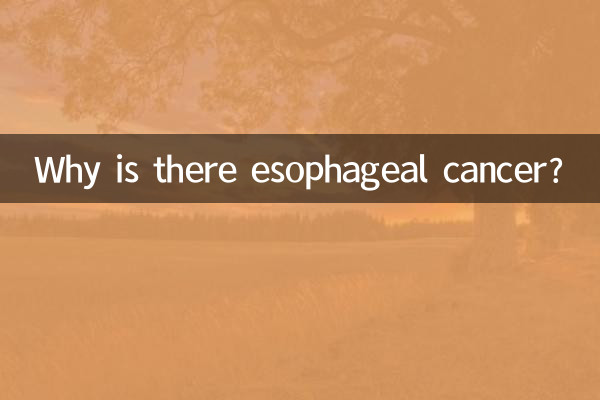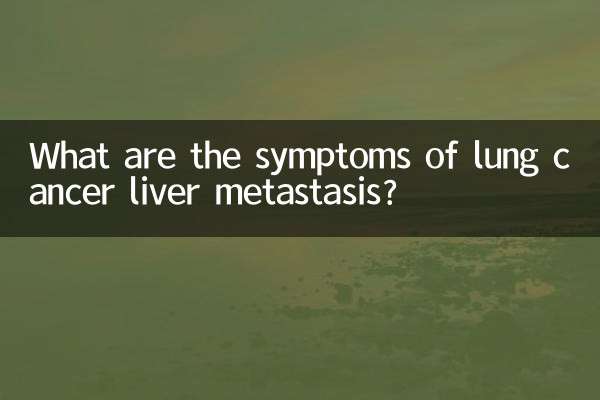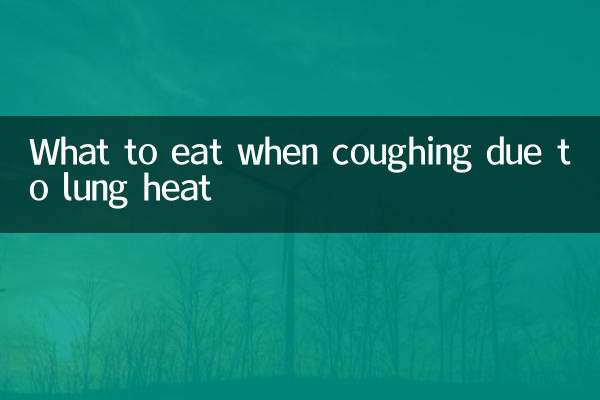Why is there esophageal cancer?
Esophageal cancer is a serious malignant tumor, and its incidence rate has been increasing in recent years. Understanding its causes and risk factors is critical to prevention and treatment. This article combines hot topics and hot content on the Internet in the past 10 days, analyzes the causes of esophageal cancer from multiple angles, and provides structured data for reference.
1. Main causes of esophageal cancer

The occurrence of esophageal cancer is related to many factors, including genetics, environment, lifestyle, etc. The following are some of the main reasons for research attention in recent years:
| Cause category | specific factors | risk level |
|---|---|---|
| lifestyle | Smoking, drinking | high |
| eating habits | High temperature food, pickled food | Middle to high |
| genetic factors | family history | in |
| environmental factors | air pollution, chemical exposure | in |
| chronic disease | Gastroesophageal reflux disease (GERD) | high |
2. Latest research data
According to recent reports from medical journals and health agencies, the incidence of esophageal cancer is closely related to:
| research project | Data results | Issuing agency |
|---|---|---|
| Smoking linked to esophageal cancer | Smokers are three times more likely to develop the disease than non-smokers | World Health Organization (WHO) |
| alcohol intake | Drinking more than 50 grams of alcohol per day increases the risk by 5 times | The Lancet medical journal |
| Eating habits survey | The risk of long-term consumption of pickled foods increases by 40% | China National Cancer Center |
| GERD Patient Tracking | Patients with a history of GERD for more than 10 years have an 8-fold increased risk | American Cancer Society |
3. How to reduce the risk of esophageal cancer
Combining expert advice and recent hot discussions, the following measures can effectively reduce the risk of disease:
1.Quit smoking and limit alcohol: Smoking and alcohol abuse are two high-risk factors for esophageal cancer. Reducing or quitting can significantly reduce the risk.
2.healthy eating: Avoid over-heated and pickled foods and increase the intake of fresh fruits and vegetables. Popular recent research shows that foods rich in vitamin C can reduce the risk of esophageal cancer.
3.Control acid reflux: Treat gastroesophageal reflux disease promptly to avoid long-term gastric acid irritation of the esophageal mucosa.
4.Regular screening: High-risk groups over 40 years old are recommended to undergo regular gastroscopy for early detection and early treatment.
4. Recent hot topics
1.Artificial Intelligence Assisted Diagnosis: Many medical institutions have begun to use AI technology to improve the detection rate of early esophageal cancer, and relevant reports have attracted widespread attention.
2.New targeted drugs: Breakthroughs have been made in targeted therapies targeting specific gene mutations, bringing new hope to patients with advanced disease.
3.Youth trend: The rising incidence rate among people aged 30-40 has triggered social discussions, and experts have called for attention to the health management of young people.
4.Research on regional differences: New research shows that the incidence rate in North China is significantly higher than that in the South, triggering in-depth discussions on the environment and dietary structure.
Conclusion
The causes of esophageal cancer are complex and diverse, but by understanding the risk factors and taking preventive measures, you can effectively reduce the likelihood of getting it. It is recommended that the public pay attention to their own health, develop good living habits, and pay attention to the latest research results and treatment methods in the medical field.

check the details

check the details